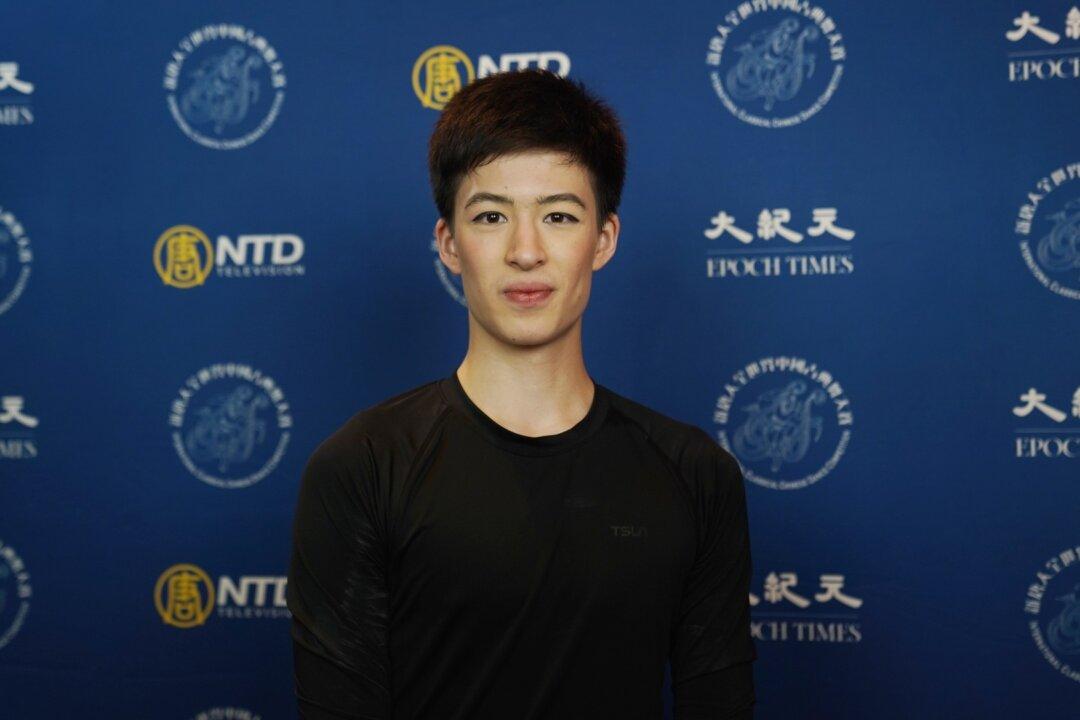“I’m very nervous!” he said after he performed in the semifinal round of the NTD International Classical Chinese Dance competition.
Classical Chinese dance is a comprehensive dance system that was passed down through the imperial courts of ancient China, being refined with every dynasty. It has ties to martial arts, Peking opera, and folk traditions that developed alongside it over thousands of years. As dance is an art that had long been passed down from master to apprentice, much was lost when the communist regime took over and set its sights on destroying China’s cultural heritage.
For his solo piece, “Loyalty Amidst Corruption,” Browde portrayed the ancient Chinese general in the midst of battle.
He aimed to express the virtues of loyalty (“zhong”) and filial piety (“shao”) in his piece, two cornerstone principles in traditional Chinese culture.
“His father dies in battle ... and despite how sad he is that his father died he still has to first be loyal to his country, and fulfill his father’s unfinished duty,” he said. “I picked him because not only was he loyal to his country, he was also filial, he picked up where his father left off, he kept fighting for his country, no matter how corrupt the officials were, he kept fighting.”
Browde knows something about determination himself, as none of his dance journey has been easy going.
It’s a dance form that requires flexibility, and dancers who start stretching when they’re younger and have more flexible tendons have an easier time, Browde said. But he hadn’t envisioned a career as a dancer early on—he only came to it when he attended a boarding school with an extensive arts program and took a class in classical Chinese dance, which later turned into his major.
“I started later so it was a lot harder for me, very painful,” he said. After the stretching, you can execute the dance moves, but movement without culture still isn’t dance.
“I grew up in America, right? So I had no previous connection to this culture. So this past couple of years has just been me trying to learn more about Chinese culture, since the purpose of this competition is to spread 5,000 years of Chinese culture that was destroyed during the Cultural Revolution, so I first had to learn,” he said.
Through his study, he developed a wish to help revive this traditional culture and impart the goodness in it to others.
“It’s actually through your movements that you’re communicating to the audience, sending them a message through this dance,” Browde said.
“Chinese culture was bestowed to them by the divine, I believe that if your moral standard is not to a certain point, then you’re not going to be able to portray these values to the audience,” he said.
This is Browde’s first competition, and so far a valuable experience.
Unlike ballet, another complete and comprehensive system of dance, this art form is not centered around form and precision.
“Classical Chinese dance is all from the inner soul, so especially as a newer dancer this was hard for me to find. So I watched all the older dancers to see how they portrayed, how they spoke through dance. Some dancers are more explosive, some put more emphasis on their poses, some dancers put more emphasis on their connection moves, it’s always different.”
Browde will be performing in the finals on Sept. 5.






